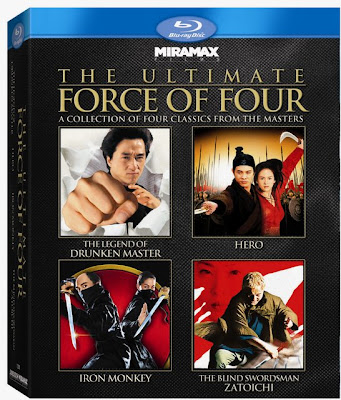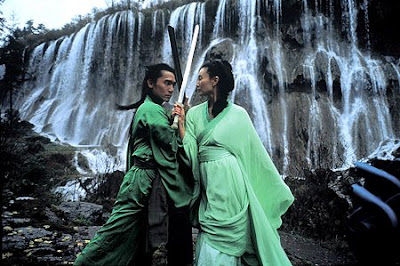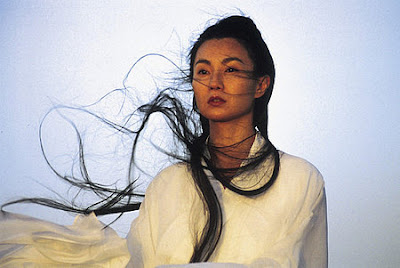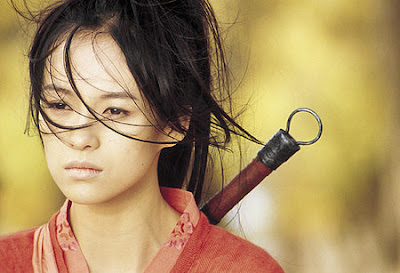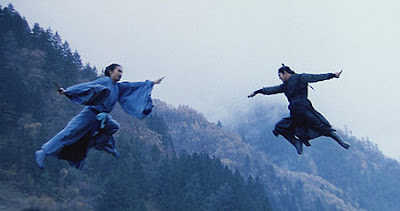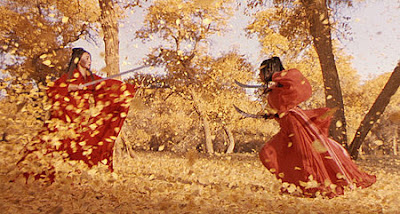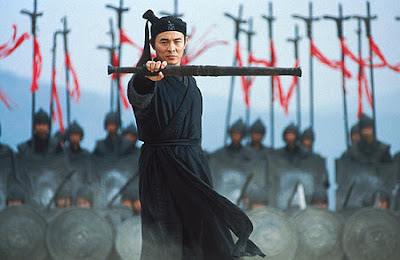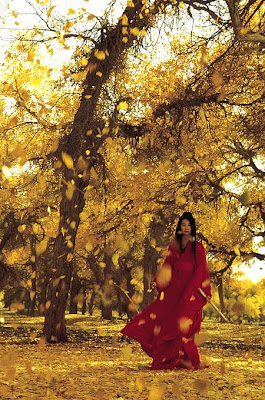Part of the New Blu-ray Set
View Photo Slideshow
Bookmark this on Delicious
Print Page
As the most prolific and highly respected Chinese Fifth Generation director, Zhang Yimou elevates the craft of filmmaking to the purist form of painterly, poetic art. With a passion for seeking out the most exquisite and emotionally potent shade of a certain color and ensuring the precise sound, cut, and rhythm in any given project he takes on, Zhang Yimou is one of cinema's most innovative and impressive directors.
While Chinese film is largely known for exploring violence and relishing in the martial arts with the tremendously breathless Hong Kong action packed titles Kung Fu fans have been devouring for decades, it took the incredibly patient Yimou roughly two decades to venture into the genre he'd always wanted to explore.
Especially interested in moving beyond the traditional swordplay of martial arts genre pictures and drawn to the "warring states period" of China during the third century B.C., he developed an original story that sought out philosophical and ethical answers regarding just what comprises a hero and worked tirelessly with two screenwriters for twenty-four months before he decided it was acceptable to begin filming.
While most filmmakers seem ready to rush into production with a treatment alone and rewriting the work as they go along when they have a big budget and A-list talent to play with since you're essentially guaranteed box office gold, Yimou has never been the kind of director who will sacrifice style for speed and quality for quantity. And sure enough, even when one of his films isn't quite the finished product viewers may have desired such as in the recent mixed bag of the sumptuous mess Curse of the Golden Flower, we can at the very least sense his singular vision, ambition, and strive for perfection on every level from beginning to end.
Perhaps most famous in America for his collaborations with former muse and romantic partner, Gong Li including Raise the Red Lantern, the daring Yimou has ventured like a true artist back and forth through several periods from sultry film noirs like Ju Dou and Shanghai Triad to politically charged epics like To Live to naturalistic neorealism focused works Not One Less, Riding Alone for Thousands of Miles and The Road Home.
Yet the one recurring theme that shows up again and again in his humanistic films is in the power of human choice and the everyday heroics of people in relation to others whether it's on a small scale or one much larger in scope. Ethical considerations and political implications run throughout his oeuvre and indeed, the period film Hero seems especially timely as a martial arts movie that doubles as an allegorical work, which reflects some recent Chinese infighting over separate states today.
Still, it's an important distinction to point out that the movies themselves are about people first and never place messages over the characters and plot since he shares that it's his belief that, "the objective of any form of art is not political. I am not interested in politics." While in the same page of quotations collected on IMDb he explains further to acknowledge his two most successful films of the 2000s-- Hero and House of Flying Daggers-- as "commercial" pictures and sure enough critics fell all over themselves comparing the movies to Ang Lee's Crouching Tiger, Hidden Dragon especially because they share the actress Zhang Ziyi, they're amazing efforts in their own right and from a visual standpoint alone, much more beautiful than Crouching Tiger.
Thankfully, to the joy of viewers, the patient perfectionist Yimou has been reluctant to cheapen his vision with CGI. Preferring to follow the image he sees in his mind, Yimou would only film a high wire fight with Jet Li and Tony Leung flying over a lake with mirror perfect still water. To achieve this effect, he spread out the shooting schedule for three weeks, using the lake for the two hours each day when the water was completely still.
In the same token, he waited for leaves to turn just the right vibrant color of gold and knowing that they would only retain their beauty and shade for three days, he filmed Ziyi and Maggie Cheung's beautiful fight within that breakneck schedule. While doing so, he urged the women not to blink as the leaves were gathered and used again and again along with eye drops due to the wind that blew dirt around in every single take.
These approaches probably seem insane to Western filmmakers as his strive for only the highest quality possible would no doubt have sent most American producers running back to their accountants and actors to their trailers in frustration over giving up control to serve the director's vision. Yet as evidenced throughout the extensive behind the scenes extras on this cinema quality Blu-ray edition of Hero, we discover that his cast and crew feel exactly the same way as Yimou fans do in knowing that he's doing his very best to ensure the movie's sensuous loveliness will imprint directly into your dreamscape.
And that is exactly what's happened to me as I hadn't seen Hero since its 2004 release yet the fight among the golden leaves and the dazzling one over the idyllic blue lake immediately sprang to mind as the film began. Furthermore, my memory of Hero consisted primarily of its overwhelming beauty since its Rashomon style tale keeps doubling back, evolving, and daring you to keep up with its labyrinthine twists.
And honestly the first time I saw Hero, I didn't keep up-- either lost in the beauty so much that I missed a few crucial subtitles or getting a couple of characters mistaken-- finally I just gave into my confusion and watched the movie for its cinematic poetry. Moreover, I was relieved to read that a few critics I greatly admire had a little trouble following not just the thread but the final twenty minutes which I'm still not sure logically works in sync with the rest.
While made in 2002, it took a full two years and the power of Quentin Tarantino to help bring the film to American audiences where it became the first foreign language movie in history to debut at #1 at the United States box office. Thus, when House of Flying Daggers was released the same year from Sony Pictures Classics rather than Miramax and produced in '04 instead of two years prior, I was among the few who preferred Daggers despite its slightly over-the-top Shakespearean inspired demise in the final showdown. However, again proof of the importance of watching movies a second time around as well as a fervent desire that I could have this opportunity more often since I take in so much media that it blurs together from time to time, I've completely changed my stance on Hero with this review.
Not only do I prefer it to the gorgeously impressive Daggers but I'm actually wondering if it is superior to Crouching Tiger due to its daring decision to explore the consequences of violence, power, self vs. country, revenge, the concept of "an eye for an eye," loss of culture, heritage, and the double-edged figurative sword of using war to create peace. However the logic of the final mental chess move made by the men leading us into various extended flashback versions of possible truths still leads viewers into philosophical circles. When presented with the events, those more intrigued by logic will drive themselves batty wondering if a) wouldn't have happened, would b) have happened as the characters find themselves in the third (or c) act or in reality why a and b would've been necessary at all. However, I'm very happy to abandon attempts to over-analyze to experience the surprisingly moving and intoxicating epic which stands among Yimou's very best.
Nominated for an Oscar and Golden Globe as the best foreign film of the year, Jet Li took quite a pay cut in the film which at the time was China's most expensive production ever created. In Hero, he stars as our nameless hero who is honored with a private audience of the King of Qin (Daoming Chen) once he's eliminated the three most ruthless assassins who've come the closest to taking the king's life to prevent his drive to conquer their states and force unification.
Bringing the famous swords of the three killers-- Sky (Donnie Yen), Broken Sword (Tony Leung) and Flying Snow (Maggie Cheung)-- as proof of his victory, Li's character, just referred to as Nameless is asked by the King to recount the success of his battles and is granted permission to take several paces closer to the man for each death.
Taking supreme advantage of film as a "show me" medium, Yimou uses a distinct, unique, and eye-popping color scheme for every single battle which begins with what is considered the "chess fight" or as Li shares a great "tennis" setup as he rematches with Once Upon A Time in China II costar Donnie Yen whom he chose for the part. The stellar sequence which has become a fanboy favorite took two weeks to film involving wire work, black and white photography, and a crisp professional approach.
Continuously topping himself throughout in this amazing collaboration with frequent Wong Kar Wai cinematographer Christopher Doyle, the chess fight is in stark contrast to the passionate and fiery love triangle that occurs between In the Mood for Love stars Leung and Cheung (in Wai's film lensed by Doyle). In this segment, Nameless exploits their relationship by using the beautiful Zhang Ziyi and Cheung's past as pawns to get the killers off their game.
Employing the familiar and effective rhythms of Crouching Tiger composer Tan Dun who utilized Itzhak Perlman on violin and Kodo drummers, the film grows much more elaborate as it moves from one eye-popping segment to the next which is further complicated when the King sees through the first version of the account by Nameless. After this occurs, we're presented with the second Rashomon-like revision where the costumes, colors, and makeup changes to balance the ever-changing explanation of just what happened and is waiting to happen.
A flawless Blu-ray presentation with extensive extra features including an in-depth Jet Li and Quentin Tarantino interview wherein Li admits that he actually cried after reading the screenplay because of the emotional power packed within the action framework, fans can also relish in storyboards, featurettes, and more.
Overall, the strongest asset to an already solid collection, Hero is a masterful work filled with beauty, sorrow, and a firm commitment to integrity infused entertainment as Yimou reminds that just because something is classified as martial arts, it doesn't have to sacrifice quality or substance. Likewise, Yimou's Hero is sure to please fans of the genre from all interest levels as you can watch it for the superlative fight choreography, majestic photography, or just one more documented example that reminds us why the word "director" is far too weak to be attached to Mr. Zhang Yimou.
Text ©2009, Film Intuition, LLC; All Rights Reserved. http://www.filmintuition.com
Unauthorized Reproduction or Publication Elsewhere is Strictly Prohibited.

